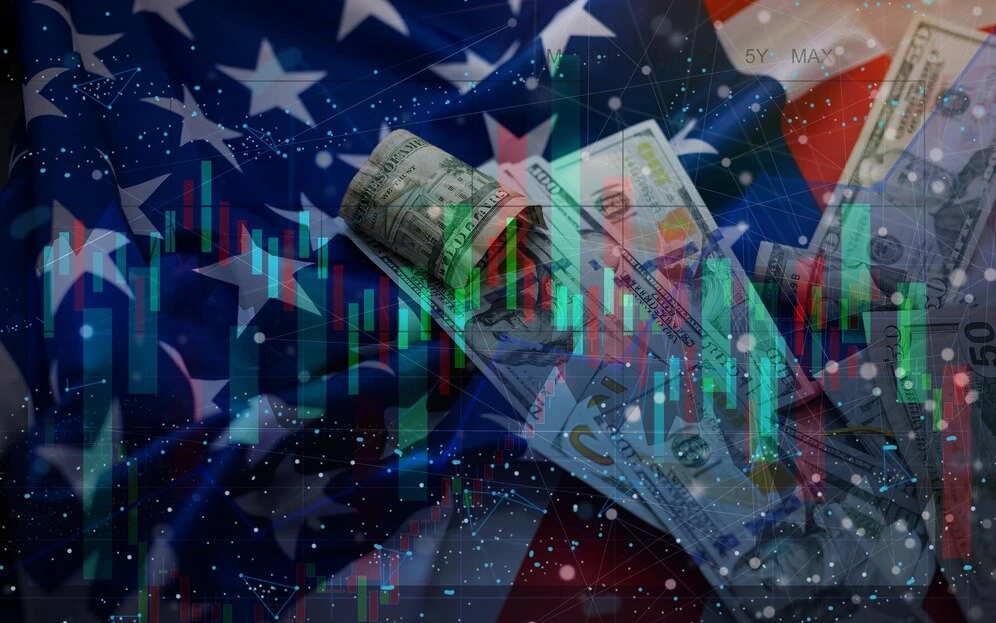(stocks fall) Global stock markets are experiencing sharp declines as investors brace for a major tariff announcement set for Wednesday. The looming trade measures, expected to target key industries such as automotive and technology, have sparked concerns about economic slowdowns, inflation, and corporate earnings. From Wall Street to Asian and European markets, indexes are tumbling, reflecting growing uncertainty among traders. In this article, we’ll break down what’s driving the market drop, which sectors are hit the hardest, and what investors should consider in the face of volatility

What Is Behind the Stock Market Drop?
The recent stock market downturn is driven by several key factors, with the upcoming tariff announcement at the center of investor concerns. As economic uncertainty looms, traders are reacting cautiously, leading to widespread sell-offs across major indices. Below are the primary reasons behind the market drop:
1. Anticipation of New Trade Tariffs
Investors are bracing for the latest round of tariffs, expected to be announced on Wednesday. These trade measures will likely target major industries, particularly the automotive and technology sectors, increasing import costs and disrupting supply chains. The fear of higher costs and reduced corporate profits is triggering market volatility.
2. Investor Anxiety and Market Uncertainty
Stock markets thrive on stability and predictability. However, tariff announcements introduce uncertainty, making it difficult for businesses and investors to plan for the future. Many traders are pulling out of riskier assets, favoring safer options like bonds and gold. This shift in sentiment has contributed to sharp declines in global stock indices.
3. Concerns About Economic Slowdown
Higher tariffs often lead to increased costs for companies, which can trickle down to consumers in the form of price hikes. This, in turn, may reduce consumer spending, slowing down economic growth. Analysts are warning that prolonged trade tensions could push the economy toward a downturn, further spooking investors.
4. Sector-Specific Impact
Some industries are more vulnerable to tariff hikes than others. For instance:
- Automotive Industry: Companies like Toyota, BMW, and Tesla face potential cost increases due to new import duties on car parts.
- Technology Sector: Companies reliant on international supply chains could suffer from higher production costs and lower profit margins.
- Retail & Consumer Goods: Increased tariffs on imports may lead to higher prices for everyday products, impacting both businesses and consumers.
As these factors combine, market volatility continues to rise, prompting investors to reevaluate their strategies. The coming days will be crucial in determining how deep this stock market dip goes and whether it stabilizes after the tariff details are officially announced.

Market Reactions Across the Globe
The anticipation of new tariffs has sent shockwaves through global financial markets, triggering widespread sell-offs across major stock indices. Investors are reacting cautiously, with many shifting their focus to safer assets like gold and bonds. Let’s take a closer look at how different regions are responding to the uncertainty.
1. U.S. Stock Market Takes a Hit
The U.S. markets opened in the red as investors digested the possibility of new tariffs.
- S&P 500: Down by 1.1%, reflecting broad-based losses across multiple industries.
- Dow Jones Industrial Average: Dropped by 0.7%, with significant losses in manufacturing and tech stocks.
- Nasdaq Composite: Declined 1.6%, as major tech companies reliant on global supply chains faced pressure.
Analysts warn that further declines could follow if the tariff announcement includes stricter trade restrictions.
2. European Markets Show Signs of Weakness
The uncertainty surrounding trade policies has also impacted European stocks, particularly in manufacturing-heavy economies like Germany and France.
- STOXX Europe 600: Fell by 1.5%, with auto and industrial stocks leading the decline.
- FTSE 100 (UK): Down 1.2%, as investors fear ripple effects on global trade.
- DAX (Germany): Slipped 1.7%, driven by concerns over potential retaliatory tariffs.
- CAC 40 (France): Declined 1.6%, as French automakers brace for potential supply chain disruptions.
European companies with strong export markets, especially in the automotive sector, are feeling the pressure.
3. Asian Markets Experience Heavy Losses
Asian markets were among the hardest hit due to their dependence on global trade and exports.
- Nikkei 225 (Japan): Plunged 4%, as Japanese automakers like Toyota and Honda saw their shares drop.
- KOSPI (South Korea): Fell 3%, as South Korea’s export-driven economy faces uncertainty.
- S&P/ASX 200 (Australia): Declined 1.7%, reflecting broader global market fears.
- Hang Seng Index (Hong Kong): Dropped over 1%, as Chinese and Hong Kong-based stocks reacted to trade concerns.
China’s economy, already facing challenges from previous trade disputes, could experience further strain if additional tariffs are imposed.
4. Investors Shift to Safe-Haven Assets
As stock markets tumble, investors are seeking stability in traditional safe-haven assets:
- Gold Prices Surge: Gold reached new highs as traders moved away from riskier equities.
- Bond Yields Drop: U.S. Treasury yields fell, signaling a rush to government bonds as a safer investment.
- Currency Markets React: The U.S. dollar strengthened against emerging market currencies, while the Japanese yen gained as a traditional safe-haven currency.
With volatility expected to continue until the official tariff announcement, global markets remain on edge. The coming days will be critical in determining whether stocks stabilize or if further declines are ahead.

Which Sectors Are Hit the Hardest?
The stock market downturn is not affecting all industries equally. Some sectors are bearing the brunt of investor fears, particularly those that rely on global trade, manufacturing, and supply chains. Below are the industries facing the most significant declines amid the tariff concerns.
1. Automotive Industry: Struggling with Higher Import Costs
The automotive sector is among the hardest hit, as new tariffs are expected to target car imports and essential auto parts. This could lead to increased production costs, reduced profit margins, and weaker consumer demand.
- Toyota: Shares dropped 6.8%, reflecting concerns over higher costs for imported components.
- Nissan & Honda: Fell 4% and 3%, respectively, as investors worry about the impact of trade restrictions.
- European Automakers: BMW and Mercedes-Benz stocks have declined by 3%, while Volkswagen lost 3.6% due to potential supply chain disruptions.
- Tesla: The electric vehicle giant’s stock is down 6.4%, contributing to a 35% year-to-date decline, as higher component costs could drive up production expenses.
If tariffs take effect, automakers may be forced to raise prices, potentially reducing consumer demand and further impacting sales.
2. Technology Sector: Supply Chain Disruptions Loom
Many technology companies rely on global supply chains, with parts sourced from multiple countries. Increased tariffs could disrupt production, raise costs, and hurt profit margins.
- Chipmakers & Semiconductor Companies: Firms like Nvidia and Intel are facing sharp declines due to fears that tariffs on electronic components will increase costs.
- Consumer Electronics: Companies such as Apple and Samsung could see higher prices for devices like smartphones and laptops, affecting demand.
- Cloud Computing & Software Companies: While not directly affected by tariffs, broader economic uncertainty could reduce business investments in tech services.
Tech stocks are historically volatile, and tariff concerns have amplified the sector’s downward trend.
3. Retail & Consumer Goods: Higher Prices for Everyday Products
Retailers and consumer goods companies that depend on imported products are also feeling the impact. Increased import costs mean businesses may need to raise prices, which could hurt sales.
- Big-Box Retailers: Walmart and Target may struggle as higher tariffs on imported goods affect their supply chains.
- Fashion & Apparel: Brands like Nike and Adidas, which manufacture goods overseas, could see profit margins shrink.
- Food & Beverage Industry: If tariffs extend to agricultural products, food prices could rise, impacting grocery retailers and restaurant chains.
Consumers may start cutting back on discretionary spending if prices rise too sharply, leading to weaker retail performance.
4. Manufacturing & Industrial Companies: Facing Higher Raw Material Costs
Industries that rely on imported raw materials—such as steel, aluminum, and machinery—are also taking a hit. Increased costs for these materials could force companies to either absorb the losses or pass them on to consumers.
- Steel & Aluminum Producers: Tariffs could raise production costs for industries that use these materials extensively.
- Machinery & Equipment Manufacturers: Companies like Caterpillar and John Deere could see rising costs for parts and lower demand for equipment.
- Construction & Infrastructure: Higher prices for materials could slow down construction projects and infrastructure development.
The industrial sector is closely tied to economic cycles, and any slowdown in trade could have long-term consequences.
Looking Ahead: Will These Sectors Recover?
The full impact of these tariffs will depend on how extensive they are and whether retaliatory measures from other countries follow. While some industries may recover quickly, those with global supply chains will likely face longer-term disruptions. Investors will be closely watching the official announcement and any follow-up actions to gauge future market trends.
Economic Outlook and Predictions
As markets react to the impending tariff announcement, investors and analysts are assessing the broader economic implications. While some believe the downturn may be temporary, others fear a prolonged period of volatility and economic slowdown. Let’s break down the key economic factors at play and what could happen next.
1. Interest Rate Speculations: Will the Federal Reserve Respond?
- With market uncertainty rising, analysts are debating whether the Federal Reserve will adjust its monetary policy to stabilize the economy.
- If tariffs lead to inflationary pressures, the Fed may keep interest rates higher for longer, potentially slowing down borrowing and economic growth.
- On the other hand, if markets decline too sharply, the Fed could consider a rate cut to support economic recovery.
Financial institutions like Goldman Sachs and Morgan Stanley have already adjusted their economic forecasts based on these possibilities.
2. Recession Fears: Is the Economy Slowing Down?
- The combination of higher tariffs, weaker corporate earnings, and slowing global trade has raised concerns about a potential economic recession.
- A prolonged trade war could hurt job growth and business investment, leading to a downturn in consumer spending—one of the key drivers of the U.S. economy.
- If major companies respond to tariffs by cutting costs or delaying expansion plans, GDP growth could slow in the coming quarters.
Some economists warn that if tariffs remain in place for an extended period, the risk of a recession in 2025 or early 2026 increases significantly.
3. Inflation and Gold Prices: The Safe-Haven Shift
- Rising tariffs could lead to higher prices on imported goods, contributing to inflation concerns.
- Consumers may see price increases on everyday products, affecting their purchasing power and leading to shifts in spending habits.
- As a result, many investors are moving toward gold and other safe-haven assets, causing gold prices to surge.
In times of economic uncertainty, gold often becomes a preferred investment, and its value has already climbed in response to market volatility.
4. Global Economic Impact: A Chain Reaction
- China and Europe: If the U.S. imposes strict trade barriers, other economies may retaliate, further disrupting global supply chains.
- Emerging Markets: Countries that rely on exports to the U.S. could see their economies slow, affecting global financial stability.
- Oil Prices & Energy Sector: A weaker global economy may reduce demand for oil, leading to falling prices and impacting oil-producing nations.
The next few weeks will be critical in determining how severe the economic impact will be. If negotiations ease trade tensions, markets could recover quickly. However, if trade wars escalate, the risk of a prolonged slowdown remains high.

Final Thoughts: What’s Next for Investors and Businesses?
- The stock market remains volatile, and short-term fluctuations are expected until the tariff details are fully announced.
- Investors should stay cautious, diversify their portfolios, and monitor developments closely.
- Businesses affected by tariffs may need to adjust their supply chains or pass higher costs onto consumers.
While uncertainty dominates the market now, the long-term economic impact will depend on how trade policies evolve in the coming months.
Table of Contents
Marine Le Pen’s Conviction: What It Means for France and the National Rally – trendsfocus
Stocks tumble ahead of Wednesday’s ‘liberation day’ tariffs announcement